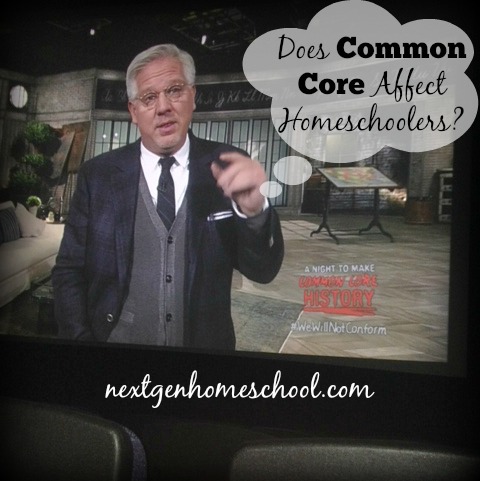As a homeschool blogger and leader in my local homeschool support group, I get a lot of questions about Common Core. Questions like:
“What’s the deal with Common Core? Why should I be concerned?
Does Common Core affect homeschoolers?“
I’ve even met parents who’ve decided to homeschool or are considering homeschooling because of Common Core. Even if they don’t know all the details, they know enough to believe they want their children out of the public school system. But is that enough?
In an effort to help a homeschooling friend of mine find her own answers, we decided to attend a live national broadcast at our local movie theater called “We Will Not Conform.” It was a town-hall style discussion of Common Core moderated by broadcaster Glenn Beck that brought together speakers such as Wall Builder’s David Barton, syndicated columnist Michelle Malkin, and FreedomWorks CEO Matt Kibbe with concerned parents and educators from across the country. Here’s a trailer describing the purpose of We Will Not Conform in Beck’s own words.
If you are unfamiliar with the basics of Common Core and why people are concerned, here’s a great starting point from HSLDA to lay the groundwork. For the purposes of this post, I’m assuming you know some of the facts.
The agenda of the We Will Not Conform broadcast wasn’t simply to inform or stir debate about Common Core, but to bring concerned Americans from all walks of life together with a common purpose: to draft a strategic action plan for those that choose NOT to conform to Common Core’s agenda and implementation.

As a homeschooler, I’m not in the daily trenches of the Common Core battle currently being waged in schools and state governments the way the concerned moms and school officials on Beck’s discussion panels are. These passionate parents, educators and policy makers are actively fighting Common Core issues head on in their communities. However, Beck addressed the homeschooling community’s role in the Common Core debate specifically when he said:
“We can’t just pull our own children out of school. We have to care about what’s happening to families everywhere, because we’re all Americans.” — Glenn Beck
So how does Common Core affect homeschoolers? Can’t we simply avoid it by homeschooling?
Glenn Beck’s opinion is that homeschooling parents shouldn’t just retreat — and on that point, I completely agree. As homeschoolers, we can’t just hide behind the walls of our homes and watch Common Core proponents and opponents in the public school system duke it out on their own turf. Homeschooling isn’t a safe haven, because Common Core reaches far beyond the public school campus.
A real-time nationwide text poll at the We Will Not Conform event found that the majority of live viewers — 57% — believed that homeschooling is the best alternative to public schools and the tentacles of Common Core (with 25% choosing private school and 13% charter schools). However, choosing to homeschool or use these forms of alternative education doesn’t shield us from bigger issues at stake revealed through Common Core that affect all Americans. One of the most concerning is that local school districts, state governments and parents are rapidly losing independent authority to make decisions regarding education — and that doesn’t bode well for homeschooling.
According to Beck, 84% of parents (regardless of political affiliation) believe that education decision-making should be left in the hands of local authority, with respect for and participation of parents. However Common Core puts a lot more decision-making in the hands of the national government. It’s not just about national education standards, as we are led to believe.
“The biggest misconception is that Common Core is about standards, and that it’s about raising the standards to be more competitive with the 21st century economy,” said syndicated columnist and author Michelle Malkin, who headed up one of the show’s solutions teams.
That’s why it’s critical for all Americans — not just those with students in public schools — to be thoroughly informed about Common Core and have an accurate understanding of what’s really at stake, Malkin stressed.
When we as homeschoolers start to dig deeper, we’ll find quickly that Common Core activity DOES affect us. HSLDA points out a few problematic Common Core agenda items that homeschoolers are not excluded from:
- Designers of the expanded statewide longitudinal databases fully intend to collect data about homeschool and private school students.
- College admissions standards will be affected: Common Core standards for college readiness will be used by institutions of higher learning to determine whether a student is ready to enroll in a postsecondary course.
- Curriculum and standardized tests are being rewritten to conform to the Common Core.
So what can we do?
The two-hour broadcast event concluded with a summary of action items for fighting Common Core from a variety of avenues as parents, educators, administrators, politicians and concerned Americans. Here’s that action plan online.
Here’s my personal take-away from We Will Not Conform:
- Get educated about Common Core. If you’re a homeschooler, HSLDA is a great place to start. You can also find lots of research and documentation at FreedomWorks and the We Will Not Conform Web site.
- Share what you’re learning about Common Core. Ask friends in your various spheres of influence if they know anything about it, and share good sources of information with them so they can also make informed decisions.
- Get connected with concerned parents in your community. Action groups are forming all across the country, and one is likely to exist in your community. Search social media for those who are already coming together and get plugged in with their activities. My local action group does everything from Webcasts and informational events to organizing peaceful rallies at state board of education events and the state capitol.
- Get political. Simply deciding to homeschool means you aren’t afraid to take action against the status quo. Take the next step and make a presence within your local government. Do you know who’s on your county school board and what they stand for? Do you sit in on school board and/or town hall meetings? Do you know where your state senators and representatives stand, and are you in the habit of contacting them about legislation that affects your rights as a parent and homeschooler?
Winning the battle against Common Core in our states is an important step toward addressing larger, more dangerous problems plaguing our national government — but that’s another topic for another day. Thankfully though, Common Core is a symptom that is garnering national attention. Concerned citizens across the country are waking up and taking action. As homeschoolers, I think we should join them in challenging Common Core and its foundation, and in doing so, we are defending our constitutional rights as parents and Americans.
Did Common Core have any influence on your decision to homeschool? How is Common Core affecting your community right now? What do you think homeschoolers should do about Common Core? What action, if any, have you taken already?

Thanks for this Renee! I’ve been lost knowing how to think about it all. This is helpful.
This was very helpful. Thank You Renee!
There are good and bad points about the Common Core Standards. I was still teaching in the public schools when they were adopted by my state. To be honest, I think the federal Common Core Standards in math were not much different than the state standards we had in CT. This standards based teaching has been around for ages-there really isn’t much that is new in the Common Core State standards. We had state standards in CT and we had state tests based on those standards. I was under the impression that it was this way for most states. Now, in CT, we have slightly different standards and tests based on these standards.
I think the majority of the public is misinformed about the Common Core State Standards and are following alarmists like sheep. How many people have actually read the common core standards before they started voicing an opinion? Are these opinions informed opinions or just something to say ?
The point is, if one is for or against the Common Core, then they should say specifically what it is that makes them feel that way. Instead, too many people seem to be making decisions based on emotional uninformed generalized views.
One particular thing that I don’t like about the common core is the way they were forced on us. States were given the alternatives….adopt the Common Core and you MIGHT get some federal financial help. If you don’t adopt them, you can forget about funding. But wait a minute, is it the Common Core I’m not liking, or is it the fact that the federal government is getting too powerful? I think I don’t like the way the federal government behaved more than I don’t like the Common Core.
Actually, the things that I don’t like in the federal Common Core Standards for math are the same as the things I didn’t like in our previous CT state standards. I don’t like the fact that the majority of the math standards are a reflection of NCTM (National Council of Teachers of Mathematics) methods and philosophies. The NCTM influence has been around since the 1920’s and they are responsible for trying to do away with memorizing basic math facts, trying to exclude division from math curriculums, not requiring correct answers, and substituting cumbersome alternatives for efficient traditional algorithms, etc.
The previous CT state math standards were a little more pro NCTM than the federal Common Core State standards. This is one reason I like the Common Core. The Common Core took the gutsy approach of mentioning the “M” word in the standards (Memorize basic facts) whereas the old CT standards merely stated that children should be familiar with the basic facts.
Another thing I don’t like about the Common Core is the testing.But wait a minute–didn’t we have that before? Perhaps people are more afraid of these tests than the old ones because of the “big brother” aura they seem to emit and the invasion of freedom by big business. Anyways, I think it’s good that the public is showing their disgust about this testing. I just wish they had done it about 15 years ago.
Okay, so here are my “likes” about the Common Core(in elementary math). I like the fact that math across the country will be consistent. Children that move with their families to a new location will find that they can “pick up” the curriculum basically where they “left off” at home. Also, I like the fact that foundational arithmetic is required in the Common Core.